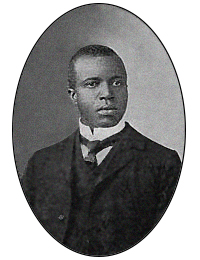Friday, February 1, 2019
Me and Black History
In 1974, when I was barely two years old, my mother bought a record: the soundtrack to the motion picture The Sting. I grew up hearing that music, particularly the movie's theme song, The Entertainer, by Scott Joplin. I would argue that with the possible exception of B.J. Thomas's Oscar-winning recording of Raindrops Keep Falling On My Head* (from Butch Cassidy and the Sundance Kid), The Entertainer was my "first song."
When you're a kid, you don't know how significant the things in your life really are, because to a kid, every new thing is significant. I didn't know that my foundational musical experiences were being shaped by Paul Newman/Robert Redford buddy-movie soundtracks. I just knew I liked these songs, and it made my mom happy when I sang them and tried to play them on a plastic toy guitar.
As I grew up, of course, I learned what "ragtime" was. I began to study music and the history of music, and of course, I picked up on the ways the music I loved most was based on traditions and ideas that came from black people. I remember learning about the ways that black musicians - particularly blues musicians - found their music being borrowed, "sanitized," and turned into the multi-billion-dollar juggernaut that is Rock-n-Roll without getting anywhere near the recognition or financial reward that their white imitators got. I suppose that pattern came up often enough that when people talked about ragtime and the music of Scott Joplin, I just assumed that his was that same kind of story.
Since his music was associated in my mind with Paul Newman, Robert Redford, and B.J. Thomas, it was easy for me to assume that Scott Joplin had taken black music and popularized it, as others have done time and again. It just never occurred to be to be curious about who Scott Joplin was or what his story was, because his name and his music had been in my head for as long as language and memory could take root.
So last year, when the subject of Ragtime came up in my History of Music in the U.S. class, it was an odd sort of shock to see a picture of Scott Joplin for the first time:
Until I was in my forties, I did not know that Scott Joplin was black.
Knowing this changes nothing about how I feel about the music. In a world that was as egalitarian and democratic as ours claims to be, this demographic note would probably not register as an important detail. But for me, the fact that I made it through more than forty-five years without knowing this plain fact about one of the first composers I was exposed to was a revelation about representation and visibility.
The concept of erasure - or, as the New York Times Magazine defines it, "the practice of collective indifference that renders certain people and groups invisible" - is something I've always been half-aware of. It's that indifference that keeps people from speaking up when some guy at a party claims that the reason there aren't more female comedians is because women aren't funny. It's that indifference that allows an elected official who thinks that only white people should be credited with the success of Western civilization to be re-elected.
Countering that kind of claim is not hard to do, assuming you have the least amount of curiosity in the subject being spouted off about. If someone tried to claim that black people have made no contribution to Western Culture it wouldn't be hard for me to poke huge holes in that claim even without citing Scott Joplin, but it says something about the larger trend of our cultural experience that even someone like me - a very curious person with a history of scholarly inquiry into these matters - can fall victim to that collective indifference.
The shock I felt upon learning Joplin's ethnicity came from realizing that I had been so incurious about Scott Joplin, I effectively rendered one of my earliest cultural influences invisible. I want to reverse that trend.
To that end, I've planned out a small series of posts like this one that will talk about specific people from marginalized groups who have been important to me, personally. I'm launching this during Black History Month because this past holiday break was the first time I had a chance to work on this, and this seemed like the kind of thing that Black History Month was created for! (I'm sure it's just a coincidence that the tradition is about the same age as me.)
Some of these stories will be about people who, like Scott Joplin, affected me in my childhood; some will be about people I've only discovered because I'm actively seeking them out now. Some will be heroes, some will be villains, and some will be people I don't like. (The Venn diagram of those three groups may be different for you than they are for me.)
My agenda here is not to call anyone out or make anyone feel bad about not knowing these things. Quite the opposite: it's to show how flawed I am, and to make a public attempt to address the flaws.
More than anything else, my hope is to introduce you to something that gives me joy - the joy of being curious.
Labels:
Black History,
music
Subscribe to:
Post Comments (Atom)

No comments:
Post a Comment